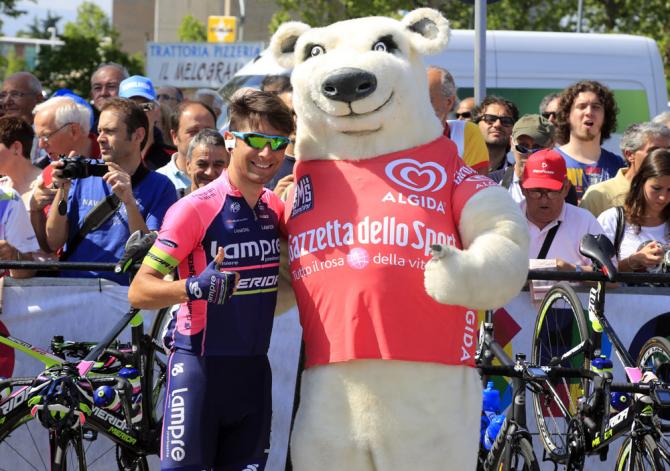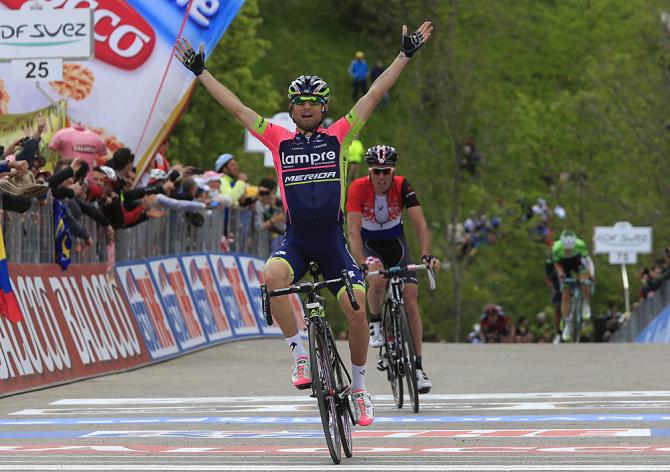Copeland expresses support for Ulissi in wake of adverse analytical finding
We believe the rider 100 percent, says Lampre-Merida manager


Lampre-Merida manager Brent Copeland has declared the team’s support for Diego Ulissi in the wake of his positive test for salbutamol at the Giro d’Italia. The team announced on Wednesday that Ulissi had returned an adverse analytical finding for the substance following stage 11 of the Giro in Savona, the same Ligurian town where Eddy Merckx left the race after a positive test in 1969.
“The way the doctors have explained it to me, the amount they’ve found is an amount that’s almost impossible to have in your urine so we’re definitely behind the rider and we believe the rider 100 percent,” Copeland told Cyclingnews when reached by telephone on Wednesday afternoon.
The team later clarified that Ulissi did not require a therapeutic use exemption to avail of a Ventolin inhaler - used to treat asthmatic complaints - but he did declare his use of the substance when providing samples to anti-doping control. The amount of salbutamol found in his urine – 1900 ng/ml – was almost twice the permissible limit of 1,000 ng/ml.
According to the team, Ulissi declared two daily puffs of Ventolin, each equivalent to 100 ng of salbutamol. Athletes possessing a TUE for more regular use of Ventolin inhalers are permitted a salbutamol threshold of up to 1600 ng/ml, which is still short of the amount in Ulissi's sample.
“He had declared that he took two puffs or whatever it was so there was no problem with his declaration,” Copeland said. “The way I understand it is that it’s an amount that’s really difficult to reach. The rider has asked for the B sample to be tested and we’ll see what happens, but obviously our reaction is one of surprise.”
Targeted testing
A double world road champion as a junior, Ulissi had long been flagged as an emerging prospect and finished the 2013 season with a string of victories including Milan-Turin and the Giro dell’Emilia. Like many at Lampre, the 24-year-old is coached by former professional Michele Bartoli - who was linked to Operacion Puerto by documents uncovered by Gazzetta dello Sport in 2007 - and he wholly outstripped pre-race expectations with his performances at this year’s Giro.
Get The Leadout Newsletter
The latest race content, interviews, features, reviews and expert buying guides, direct to your inbox!
Ulissi was singled out for targeted anti-doping testing following his two stage victories in the opening week of the Giro, on the uphill finish at Viggiano on stage 5 and – rather more surprisingly – on the first mountain stage to Montecopiolo three days later.
From that point on, making his way to the anti-doping caravan post-stage became a regular ritual for Ulissi, as had been the case for Mauro Santambrogio twelve months previously.
Ulissi was among the fallers on the road to Savona on stage 11, and after detailing his injuries to an Italian television crew on crossing the line, he was again led away by the anti-doping chaperone for testing. Copeland, however, said that he was not alarmed by the testers’ focus on Ulissi.
“No, with the victories that he got and the way he was riding it was normal that they would be testing him,” Copeland said. “They had many tests before that stage as well and that was on the 11th stage to Savona when he crashed but obviously he had many tests before that and obviously nothing came up from that so we can’t really understand how it’s possible.”
Ulissi continued to be tested beyond stage 11, including after his startling second place finish in the Barolo time trial the following day. Copeland said that Lampre will now request the results of all of Ulissi’s samples from the Giro in order to compare them to his Savona sample.
Premature abandon
Ulissi’s Giro proceeded to come to an abrupt halt during the third week. He was a non-starter on stage 18 to Rifugio Panarotta, citing an illness which Copeland said was not directly related to his use of an inhaler.
“He had been having a chest problem for a while and then he got the flu on the second rest day and just never recovered from the flu,” Copeland said. “He got a fever and we just decided it was better for him to abandon, take some time off and then start getting ready for the national championships, which he was meant to do this weekend.”
Indeed, Ulissi was travelling to Trentino for a pre-championships gathering with the Italian national team on Wednesday morning when he was informed of his positive test. He immediately withdrew from the training camp.
“He’s obviously devastated. It’s news that any rider who believes in himself like he does never expects to receive so he’s very surprised and disappointed,” Copeland said. “It’s just one of those situations. It’s always hard for a rider to defend himself until the B sample is tested.”
It’s a trying situation, too, for the Lampre-Merida team, already mired in the long-running Mantova doping investigation, which is centred around the team’s links with pharmacist Guido Nigrelli in 2008 and 2009. Former world champion Alessandro Ballan has already been handed a two-year ban by CONI and the criminal trial is due – finally – to begin in earnest in October of this year.
“It’s never nice to get this kind of news but we look forward and keep at it, and we’re not going to let this get us down,” said Copeland.

Barry Ryan was Head of Features at Cyclingnews. He has covered professional cycling since 2010, reporting from the Tour de France, Giro d’Italia and events from Argentina to Japan. His writing has appeared in The Independent, Procycling and Cycling Plus. He is the author of The Ascent: Sean Kelly, Stephen Roche and the Rise of Irish Cycling’s Golden Generation, published by Gill Books.